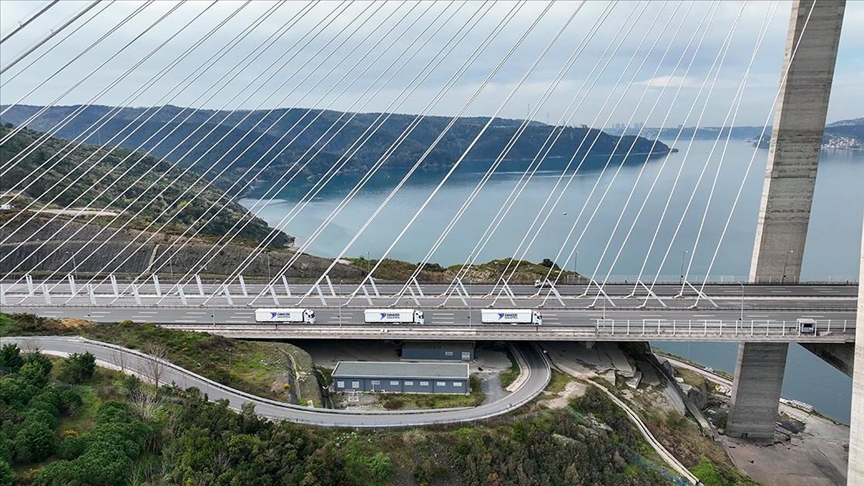ISTANBUL
Geopolitical developments and the restructuring of global supply chains have brought the Middle Corridor route, of which Türkiye is an indispensable part, to the forefront of global trade.
Türkiye ranked 11th in global logistics service exports, accounting for 2.5% of the global share, with its logistics and transportation sector making up 34.6% of its total service exports in 2024, according to the Turkish Trade Ministry.
The ongoing Moscow-Kyiv war, sanctions imposed on China and Russia, and rising security risks in the Middle East have underscored the importance of the Middle Corridor trade route, also known as the Trans-Caspian International Transport Route, which stretches from China to Europe.
Türkiye is strategically positioned at the center of this route, benefiting from the country’s growing role in global logistics networks, acting as a gateway to North African, European, and Eurasian markets.
The country is working to further enhance its logistical infrastructure through projects such as the Baku-Tbilisi-Kars railway, the Marmaray rail tunnel running beneath the Istanbul Strait, and the Northern Marmara Motorway.
The Turkish Trade Ministry is implementing various incentives for the logistics and transportation sectors with the goal of turning Türkiye into a logistics hub.
The Overseas Logistics Distribution Networks Project (YLDA), launched in 2022, aims to help exporters access supply and distribution chains more quickly and at competitive prices. The project also seeks to create an infrastructure that stabilizes Türkiye ’s export performance in key markets.
Türkiye’s investments and incentives for its infrastructure, logistics, and transportation sectors support the Ministry of Trade’s $48 billion and $78 billion service export targets for 2025 and 2028, respectively.
Mustafa Dincer, chairman of Istanbul-based Dincer Logistics, told Anadolu that Türkiye has great potential in the logistics sector and that the 2024 and 2028 targets are “realistic and achievable with the current dynamics of the sector and strategic decisions by major players.”
Dincer pointed out that logistics centers in Türkiye are expanding, and incentives for green practices and efficiency are increasing through digitalization efforts.
In reference to the Overseas Logistics Distribution Networks Project, Dincer said: “The YLDA Project requires the design and the management of all end-to-end logistics operations, covering the entire process from the moment a product is received in the country to the moment it is delivered to the end consumer,” adding: “The project was designed as a support mechanism for the sector but also as a tool to increase our exports and strengthen our position in target markets.”
Dincer noted that international logistics costs can be high and rental prices for offices and distribution centers are costly, which is why the project will provide “a leap forward” in exports of goods and services for Türkiye.
“We can easily access the support limits of support in this project, which will provide 70% to 50% support in different categories,” he added.
He also stressed that access to finance remains a critical issue in logistics.
“Public support, international funds, and private sector collaborations play key roles in boosting the capabilities of companies but more financial incentives are needed for green logistics investments, intermodal transportation projects, and digitalization efforts. It has become an inevitable necessity to move towards sustainable developments, in line with the European Green Deal,” he said. “The recent developments in our economy may cause companies to see a better future than the past and investors who feel safe do not hesitate to invest in our country.”
Dincer emphasized that Türkiye faces serious competition from China, Germany, the Netherlands, and the United Arab Emirates due to their strong infrastructure and trade connections. However, Türkiye holds a competitive edge in the development of alternative trade routes and quick customs operations.
He noted that China has become Türkiye’s main rival with its state-issued incentive programs, while the EU also offers various incentives to develop the logistics sectors of its member states.
“Türkiye needs to focus more on infrastructure investments and develop incentive strategies to rival China, Germany, and other key players in logistics,” he said.
“Türkiye ranked 47th in the world in 2018 (according to the World Bank Logistics Performance Index), and the country rose to 38th (place) in 2023, thanks to the intensive efforts of our government,” he noted. “Türkiye’s logistics sector is expected to grow even more in the next five to 10 years with more integrated centers, digitalized customs processes, and expanded railway lines.”
“Türkiye’s role in logistics has become even more important with changes in global trade corridors and sanctions on China, and speeding up its customs processes, boosting its port capacity, and expanding its intermodal transportation will bring strong growth momentum to the country,” Dincer added.

